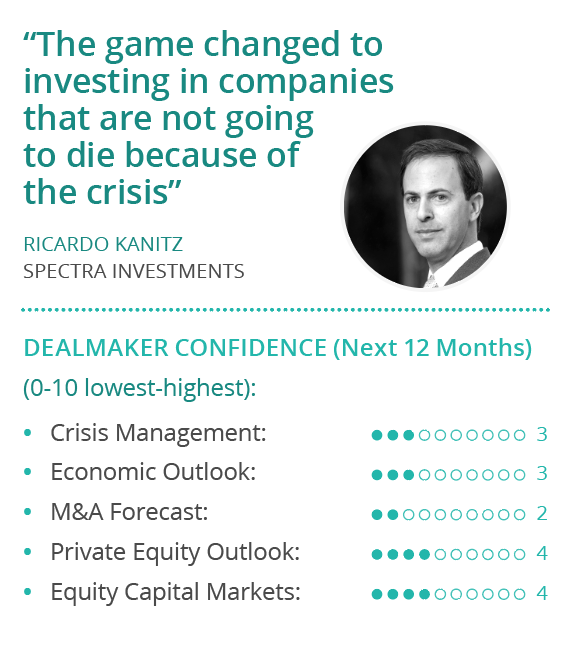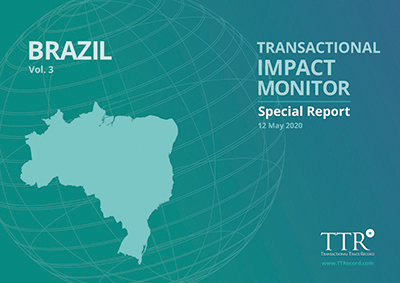Transactional Impact Monitor: Brazil – Vol. 3
12 May 2020
TTR’s Transactional Impact Monitor (TIM) is a Special Report combining local knowledge and market visibility from top dealmakers developed to address extraordinary situations affecting the macroeconomic stability and M&A outlook in core markets
INDEX
– M&A Outlook
– Private Equity
– Equity Capital Markets
– Handling the Crisis
– Dealmaker Profiles
Seven weeks into the global lockdown, several state governments across Brazil, including Paraná and Santa Catarina, have begun allowing businesses to reopen as the country tiptoes towards normalcy. A phased reopening across the state of São Paulo began on 10 May.

The official death toll attributed to the SARS-CoV-2 virus continues to mount, meanwhile, surpassing 10,000 in recent days, and along with it pressure against a defiant President Jair Bolsonaro. Bolsonaro sacked his health minister in mid-April following weeks of contradicting each other in public over the gravity of the health threat. Two weeks later Bolsonaro’s minister of justice resigned after the president fired the director general of the federal police, resulting in a legal inquiry that has triggered calls for his impeachment among political opponents.
National development bank, BNDES, continues its efforts to provide short-term liquidity to struggling companies, announcing a process to select fund managers to administer BRL 4bn in loans for small and medium-sized enterprises (SMEs) in a tender closing 3 June. News of the tender comes less than a month after the government announced it would make BRL 40bn available to SMEs impacted by the forced closure of “non-essential” businesses in the face of the SARS-CoV-2 threat. To date, only BRL 666m of the BRL 40bn has been approved in payroll support for some 30,000 businesses, according to local press reports.

“We are having similar problems as in the US,” said Spectra Investments Founder Ricardo Kanitz. “The stimulus was given through banks, and instead of going to the companies that need it most, the banks are giving it to their best clients,” he said, noting that the government was now trying fix the process.
The Ibovespa gained 2.75% in the first week of May, recovering the week’s losses as blue chips pushed the market higher and the US and China struck a conciliatory tone on trade.
Brazil’s transactional market is also beginning to stabilize, with deal volumes down dramatically over 2019, but plenty of activity keeping advisors occupied as they continue to isolate themselves in home offices.

Madrona Advogados began 2020 full of confidence, its partners convinced it would be another great year based on their robust pipeline of M&A, capital markets and infrastructure projects, said Founding Partner Ricardo Madrona.
The wave of privatizations, concessions and infrastructure projects was generating a strong flow of funds from abroad, he said. The firm was investing in its internal growth to keep up with the growing workload, securing additional office space and hiring, he said. “We never imagined this would come. Although we had information about what was happening in China, we didn’t expect it would have this kind of impact in Brazil.”
The firm didn’t have remote work infrastructure in place and was caught offguard when the most cautious voices in the federal and state governments began issuing stay-at-home guidelines, he said. By the end of March, however, Madrona had secured the hardware and software required to maintain productivity remotely. “We had to adjust very quickly.”

Today, the firm’s staff is completely “connected and inter-connected”, Madrona said, with video conferencing having become the new normal. “It’s crazy, but at the end of the day, we’re seeing we can work remotely.” This new way of working will remain in place to some degree beyond the immediacy of the crisis, he said.
“From a legal perspective, due diligence efforts under these new circumstances aren’t that different,” said Demarest Advogados Partner José Diaz, “Since we are already very much used to the virtual data rooms.” From a technical point of view, on the other hand, there are usually a few problems, Diaz said. “We are frequently involved in agribusiness and forestry deals and there we find several restrictions regarding access. However, in practice those due diligences are still being carried out, regardless of a few obstacles,” he added.
M&A Outlook
… Click here to access the third issue of Transactional Impact Monitor: Brazil – Vol. 3.

